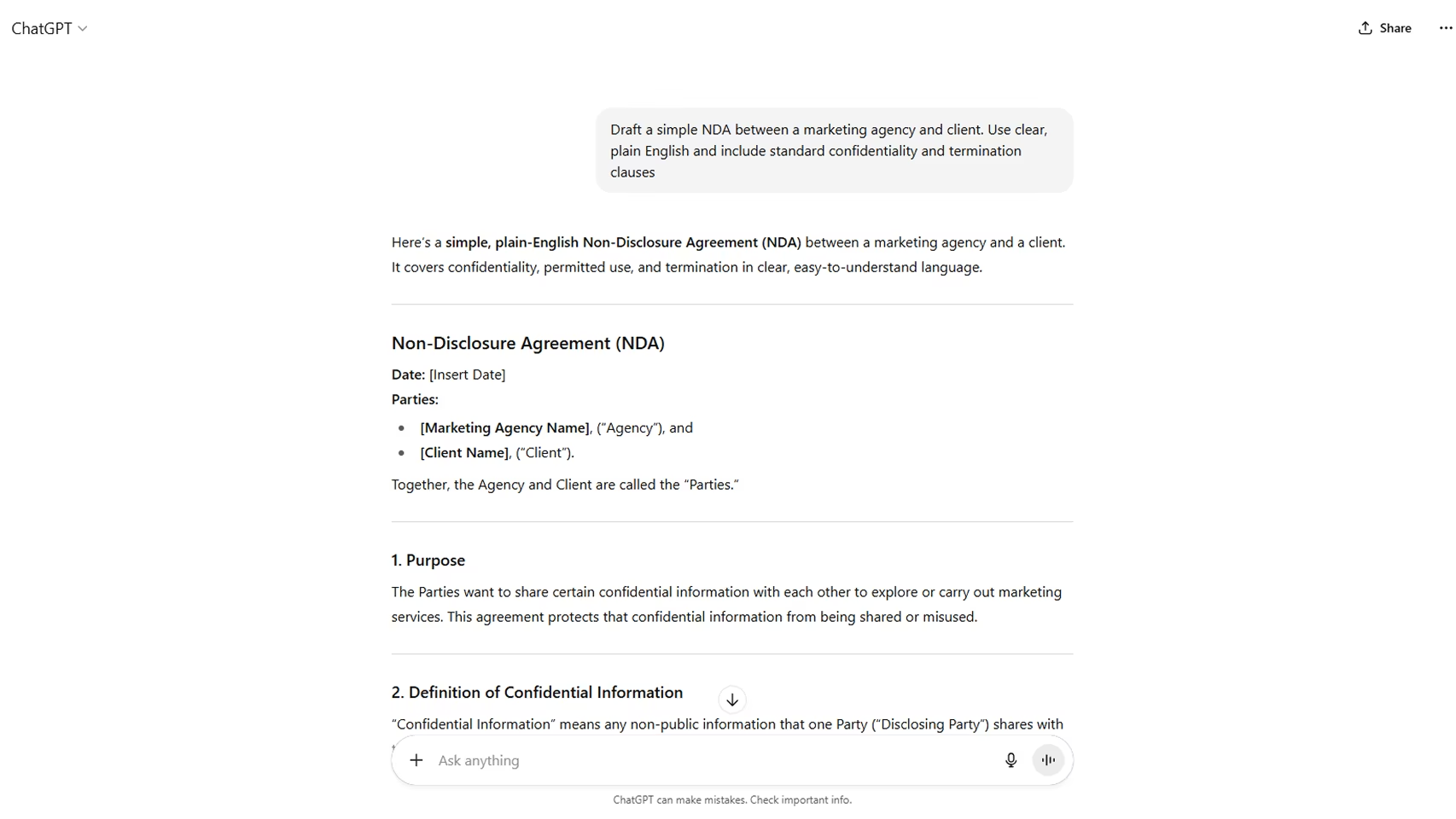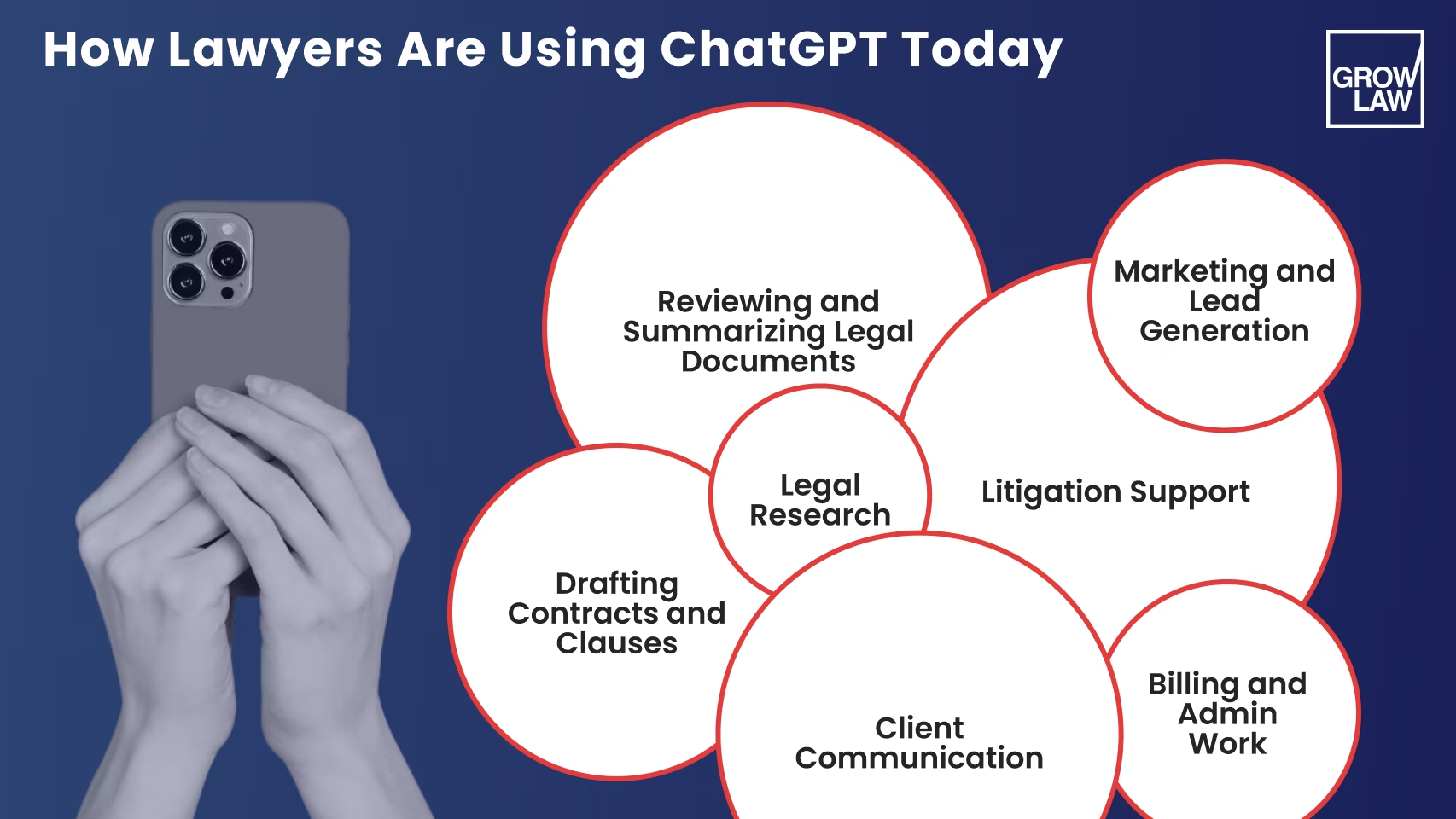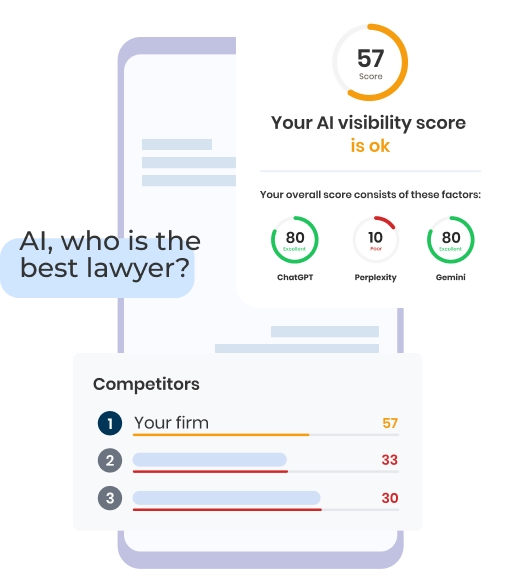Table of Contents
You’ve definitely heard about ChatGPT, and you're probably already using it.
82% of law firms (up from 39% last year!) are exploring or already using ChatGPT and tools like it.
But while AI is flooding the streets of the legal sector, some questions remain.
Is ChatGPT advisable for legal professionals? Is it reliable? Is it here to replace lawyers? Where should you use it (and where not)?
In the next 15 minutes, we’ll break down what ChatGPT can really do for your practice and how to turn it into a competitive advantage.
Key Takeaways:
- ChatGPT is speeding up the work. It helps draft, summarize, and research faster, so lawyers can focus on strategy instead.
- It’s affordable. Law firms can tap into AI's efficiency without adding staff or way more software.
- Accuracy still needs oversight. ChatGPT can miss context or laws, so human review remains non-negotiable.
- Legal-specific AI tools offer trade-offs. Trusted legal databases like MyCase IQ or CoCounsel are safer but less flexible.
What is ChatGPT for Law Firms
ChatGPT launched in November 2022, and within a year, it had over 180 million users worldwide. Pretty impressive!
At its core, ChatGPT is an AI-powered generative AI tool that drafts and organizes text based on your prompts. For law firms, it can:
- Write contracts and clauses
- Summarize depositions, legal briefs, or lengthy documents
- Create clear client updates
- Outline case arguments in seconds
Unlike traditional legal software, there’s NO setup, templates, or training. You just ask, and it delivers.
Why does this matter? Because you shouldn’t be spending your $200+ billable hour formatting time entries or writing first drafts.
ChatGPT helps you offload the routine legal work, so you can focus on your clients and maybe even take a weekend off.

— What Makes ChatGPT Different from Traditional Legal Tools
Older legal tools need "work" before the work.
You waste 30+ minutes on filling out a form, setting it up, or using clunky interfaces that take forever to learn. ChatGPT is different. Open the tool, make your ask in plain English, and it gets to work.
A remarkable 79% of lawyers say AI will have a “significant or transformative impact” on their practice within the next three years.
ChatGPT changes how you delegate. Instead of kicking rocks, waiting for a paralegal to draft or summarize something, you can have ChatGPT generate a first pass in seconds, all ready for your review.
How Lawyers Are Using ChatGPT Today
You’ve seen what ChatGPT is, but the question is, what can it do for you?
Many lawyers across every practice area are testing it out for generating legal documents, conducting legal research, client communication, and even trial prep. P.S. It’s not here to replace your expertise; it’s just here to give you back your time.

— Drafting Contracts and Clauses
Let’s start with the big one: drafting. ChatGPT can generate content for NDAs, service agreements, and standard clauses in seconds based on legal principles.
You’ll still polish the language, of course, but it handles the initial drafting and final polishing so you’re not rewriting the same paragraph for the hundredth time.
— Reviewing and Summarizing Legal Documents
Got a 40-page contract or a deposition you’ve been avoiding? ChatGPT can pull out key points, flag red flags, and turn it all into a plain-English summary you can review in minutes. It’s not perfect, but it’s a huge time-saver for early review and prep.
— Legal Research
We like to think of ChatGPT as a brainstorming buddy, not necessarily a full-fledged law library. It can help you outline research angles, clarify complex topics, and generate quick overviews before you dive into Westlaw or Lexis.
TLDR: It’s great for organizing your thoughts and getting "unstuck" fast.
— Client Communication
Client emails sometimes take 20 minutes to write. ChatGPT can handle the first draft for you in seconds.
At least 44% of legal tasks can be automated... imagine the time saved!
You can spin up an update, a summary, or next steps just like that. AI tools help you say what you mean — clearly and confidently. You'll have fewer rewrites, less overthinking, and clients who always feel in the loop.
— Litigation Support
When you’re prepping for trial, ChatGPT can help organize case facts, outline arguments, or even draft cross-exam questions. It won’t replace your legal mind. But it’s great for structuring ideas fast and spotting what’s missing before you head into court.
— Marketing and Lead Generation
Marketing doesn’t have to be frustrating. ChatGPT can help you with legal marketing content like blog posts, social captions, and client emails that actually sound like you. Think of it as a starting point — it gets the ideas out of your head and onto the page so you can edit and publish faster.
— Billing and Admin Work
And then there’s billing: the least fun part of any lawyer’s day!
ChatGPT can clean up time entries, format logs, and even draft billing notes that make sense to clients. It’s a small change that saves tons of hours at the end of every month.
What Are the Benefits of ChatGPT for Law Firms?
Let's get to the fun stuff: Is ChatGPT really worth your time in a highly competitive legal landscape?
Don't think of it as a tech upgrade. It’s a delegation shift to get your work done faster, leaner, and with fewer 10 PM work days.
— Time Savings and Productivity
With ChatGPT for law firms, the 10+ hours you’d normally spend drafting, formatting, or summarizing can shrink to minutes... yep, minutes!
In fact, you could save as much as 240 hours a year on legal analysis, document reviews, legal research, and more.
ChatGPT takes over the repetitive work, so your focus stays on legal strategy, taking on more clients, and growing your practice.
— Affordability and Scalability
ChatGPT for lawyers is the most affordable hire you’ll ever make. It scales with your workload, handling routine drafting, research, and admin when things pile up.
You’ll get more done without adding to payroll (nice!), making it one of the smartest, most cost-effective tools a modern firm can use.
— Early-Stage Drafting Power
ChatGPT in the legal profession shines when you need a strong first draft. Whether it’s a contract, memo, or client email, it helps you get ideas on paper fast... so you’re never starting from a blank screen.
You can refine and fact-check later, but ChatGPT gets the ball rolling.
ChatGPT's Limitations and Drawbacks
It’s not all rainbows and sunshine.
ChatGPT can save you time, sure, but it’s far from perfect. Here are a few things to watch out for before relying on it too heavily.
— Date limitations in LLMs
ChatGPT doesn’t have real-time access to current legal databases or breaking case law.
Its knowledge is based on the data it was trained on, which means it can miss recent rulings or updates. Always double-check anything time-sensitive or case-specific.
— Accuracy and Hallucination Risks
Sometimes, ChatGPT sounds confident... even when it's confidently wrong. The model can “hallucinate” by generating fake cases or citations that look legitimate.
A 2024 study found that ChatGPT “hallucinated” citations in 60% of legal queries without verification.
That’s why lawyers still need to verify every claim or reference before including it in client-facing work.
— Ethical and Confidentiality Concerns
Confidentiality is non-negotiable in law, and ChatGPT isn’t a secure document vault.
Feeding it client data or private case details can expose sensitive information. Use anonymized inputs or closed, enterprise versions to stay compliant.
— Jurisdiction-Specific Limitations
ChatGPT doesn’t fully grasp the nuances between state and federal laws... or international jurisdictions.
One in five lawyers who’ve tried generative AI said they encountered at least one factual or citation error in outputs.
Sure, it’s great for general research, but you’ll still need to apply your own expertise when it comes to local statutes and precedents.
Want to steer clear of these traps? Learn how to use AI for Lawyers the right way!
Lawyer Feedback: What Real Legal Teams Say
So, what do lawyers actually think? Here are a few honest ChatGPT for lawyer reviews from the field.
Solo and small-firm users often treat ChatGPT like a fast drafting engine. It’s not perfect, but it gives them a 70–80% first pass, so they aren’t staring at a blank page.
Larger firms and litigators emphasize caution. One judge issued a $5,500 fine to an attorney for submitting fictitious case citations generated by ChatGPT, warning that using AI without verifying it is “playing with fire.”
Another federal court dismissed a case and fined PI lawyers $5,000 after they cited fake ChatGPT-generated precedents in their briefs.
Bottom line: It’s a powerful assistant when used carefully, but don’t let it draft your filings unchecked.
ChatGPT vs Other Legal AI Tools
Luckily, ChatGPT isn’t the only player in the game.
Several AI tools are built specifically for lawyers... with stronger security, legal data access, and workflow integrations.
Let’s see how ChatGPT stacks up against the platforms law firms are actually using.
— ChatGPT vs MyCase IQ
When it comes to your daily work, ChatGPT for lawyers is more flexible than MyCase IQ.
You can draft, summarize, or brainstorm on the fly: no setup, no rules. MyCase IQ, on the other hand, is built for structure. It’s tied right into your case management system, keeps everything secure, and automates repetitive legal tasks.
If you want creativity and speed, ChatGPT wins. If you want control and compliance, MyCase IQ takes the lead.
— ChatGPT vs Juro AI Assistant
Does your firm handle a high volume of contracts? Juro AI Assistant is built for you.
It’s designed to review, draft, and manage agreements within Juro’s contract platform.
ChatGPT for lawyers, meanwhile, is more versatile. It can help with clauses, summaries, or negotiations, but it’s not purpose-built for contract workflows.
For contract-heavy teams, Juro’s structure wins; for flexibility, ChatGPT still holds its ground.
— ChatGPT vs CoCounsel
CoCounsel is built specifically for legal research and case strategy.
It pulls data from verified legal sources, making it far more reliable for citations and precedent analysis.
ChatGPT for lawyers, on the other hand, is great for outlining arguments, brainstorming strategies, or simplifying complex concepts... but it’s not connected to live legal databases.
For accuracy and legal depth, CoCounsel wins; for creative thinking and speed, ChatGPT holds its edge.
Check out the top 10 legal AI tools trending in 2026.
— When to Use General AI vs Legal-Specific AI
General tools like ChatGPT are great for brainstorming, writing, and early drafts.
Legal-specific AI tools (like CoCounsel or MyCase IQ) are better for research, compliance, and case management.
You have to use the right tool for the right job. ChatGPT optimization for law firms paired with legal AI allows you to blend both: the creativity of ChatGPT and the accuracy of legal AI.
ChatGPT Prompt Examples for Lawyers
The real power of ChatGPT comes from the prompts you use.
The better your instructions, the better your results. To get you started, here are some tried-and-true ChatGPT prompts for lawyers:
Prompts for Drafting Contracts
“Draft a simple NDA between a marketing agency and client. Use clear, plain English and include standard confidentiality and termination clauses.”
Prompts for Reviewing Legal Documents
“Summarize the key risks and obligations in this lease agreement in bullet points.”
Prompts for Client Communication
“Write a short update email to a client explaining next steps after filing a personal injury claim.”
Prompts for Legal Research
“List the most recent federal cases (as of 2026) involving wrongful termination due to discrimination.”
Want more examples? Check out the 8 Best ChatGPT Prompts for Lawyers!
Wrapping Up: Should Law Firms Use ChatGPT in 2026?
In short: yes! By now, you know that using ChatGPT dramatically cuts admin time, speeds up case prep, and helps you connect with clients faster than ever.
But here’s a friendly reminder:
- Use ChatGPT for drafting, research, and brainstorming... but always verify outputs.
- Pair it with legal-specific AI tools like CoCounsel for accuracy and compliance.
- Keep experimenting: firms that adapt fastest will lead the market.
P.S. Just like you, potential clients are using ChatGPT to find lawyers. Do you show up? Or does a competitor?
Check your AI visibility score in just 2 minutes and find out!











